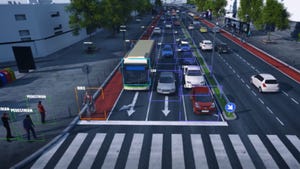Chinese Startups Leading The AI Revolution
June 27, 2017

Artificial Intelligence is likely to entirely transform global enterprise in the next 15 years. But it’s not large businesses that lead the way – according to new research carried out by Accenture - at the helm of this revolution are entrepreneurs and start-ups, mainly located in China.
China has become a powerhouse of innovation in deep learning, sensors, predictive maintenance, and intelligent robotics over the last 5 years.
Funding for AI start-ups worldwide has grown at an annual growth rate of nearly 60% since 2010. In this time, China has filed more than 8,000 AI patents, a 190% growth rate that outpaces other leading markets significantly.
For many, AI is a solution to a common problem - the need to improve efficiencies and reduce running costs. And analysis from Accenture suggests that AI could boost China’s productivity by 27% by 2035 which in turn would generate an additional economic output of more than $7,000 billion.
There is no doubt that AI can automate many processes, strengthen the bottom line and ultimately improve economic productivity. However, AI has a far greater opportunity to create entirely new categories of products and services. It will establish new markets and drive growth.
AI’s boost of the top line is reflected in the prediction that annual economic growth rates in China could increase from 6.3% to 7.9% in 2035 if companies harness AI to transform their entire business models.
Personalised experience – How is AI being used differently?
To achieve this growth potential means going beyond using AI to do things differently and, instead, using it to do different things.
For example, JD.com, the online retailer, is exploring AI to improve internal operations through unmanned warehouses and drone delivery but is also applying it to personalise the shopping experience and develop new products and services.`
Alibaba partners with SAIC to connect their cars to the internet and is introducing new cloud-based AI services targeting the health care and manufacturing sectors.
Tencent, the provider of WeChat, is developing virtual assistants and autonomous driving among other applications.
China also has many successful AI start-ups, for example, Malong Technologies’ product recognition AI uses deep learning which is applied to analyse worldwide fashion colour trends to help thousands of textile makers predict global fabric demand.
Innovate and scale
Breakthroughs such as these require businesses not just to develop innovations, but also to scale them.This means pivoting wisely the bulk of investment from core products and services to new ones, while at the same time continuing to transform the core.
Do companies build in-house capabilities, work with partners, or buy technologies from the outside?
When looking at a global sample of Fortune 100 companies and Accenture’s global index of 100 AI-driven enterprises, we found that 27% did one or the other well, and 56% did neither sufficiently. Only 17% scored high on both counts. This gives these ‘Collaborative Inventors’ a higher AIQ than the rest (see chart below). Companies with a high AIQ use it to focus on three strategic priorities: technology, data and people. ‘Collaborative Inventors�’ know how to integrate combinatorial AI technologies, embracing a platform-based approach.
Most important, people are at the heart of AI.
And AI-driven companies need to source a diverse range of talents – from data scientists to behavioural experts to those steeped in functional or industry contexts.
One of the core differentiators of China’s AI scene is the establishment of a multi-stakeholder environment that involves both the private and public sectors.
Virtual lab
The lab will not exist in a physical structure, but via a virtual, digital network of researchers working on problems from their respective locations. China also benefits from having a fast- growing domestic platform economy which provides a foundation from which its AI start-ups can succeed abroad.
Beginning of an Epoch
In the rush of investment and innovation that we can expect in the coming years; it is important that AI leaders in China remain committed to responsible AI. That means AI-based business practices and technologies must be transparent, accountable and fair.
Above all, it means that AI must be human-centric.
Responsive and responsible innovators in China will appreciate that AI is not about eliminating people, but elevating them. It’s not just about automating what people do, but augmenting their capabilities.
And according to Paul Daugherty Chief Technology Officer at Accenture, ‘as China advances the Fourth Industrial Revolution through its strength in AI, it can do no better than to adhere to the principle: AI for the people, by the people.’
It’s time for us to all join in.
Link to original source: http://bit.ly/2sieRbp
You May Also Like
.jpg?width=700&auto=webp&quality=80&disable=upscale)
.jpg?width=700&auto=webp&quality=80&disable=upscale)
.jpg?width=700&auto=webp&quality=80&disable=upscale)




